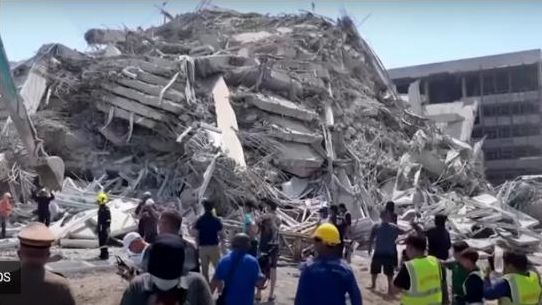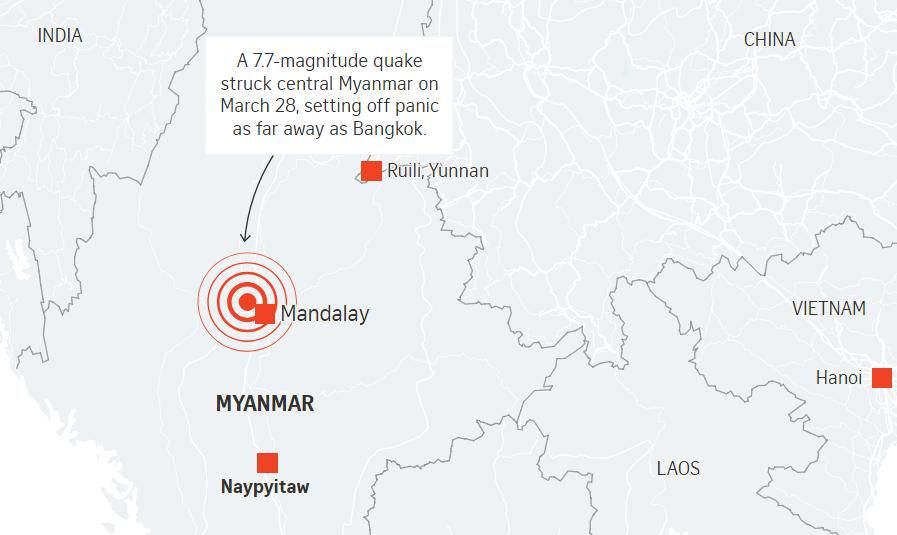By Eric Vandenbroeck and co-workers
Bangkok ground to a halt on
March 28 after a strong earthquake shook the clogged Thai capital, causing
chaos and triggering city-wide evacuations that left many thousands of people
stranded for much of the day.
Foreign rescue teams began flying into
Myanmar on March 29 to aid the search for survivors of an earthquake that
killed more than 1,000 people in the impoverished South-east Asian nation,
crippling critical infrastructure amid a grinding civil war.
The death toll in
Myanmar was 1,002, the military government said on March 29, up sharply from
initial state media reports of 144 dead on March 28.
At least nine people
were killed in neighbouring Thailand, where the 7.7
magnitude quake rattled buildings and brought down a skyscraper under
construction in the capital, Bangkok, trapping 30 people under the debris and
leaving 49 missing.



The US Geological
Service’s (USGS) predictive modelling estimated the death toll could exceed
10,000 in Myanmar and that losses could exceed the country’s annual economic
output.
The quake damaged
roads, bridges and buildings in Myanmar, according to the junta, whose top
general made a rare call for international assistance on March 28.
“Search and rescue
operations are currently being carried out in the affected areas,” the junta
said in a statement on state media on March 29.
A Chinese rescue team
arrived in Myanmar’s commercial capital of Yangon, hundreds of kilometers from
the hard-hit cities of Mandalay and Naypyitaw, the country’s purpose-built
capital, where parts of a 1,000-bed hospital were damaged.

A Chinese rescue team
arrived in Myanmar’s commercial capital of Yangon, hundreds of kilometres from the hard-hit cities of Mandalay and
Naypyitaw, the country’s purpose-built capital, where parts of a 1,000-bed
hospital were damaged.
Russia, India,
Malaysia and Singapore were sending planeloads of relief supplies and personnel
to Myanmar, which has been ravaged by a civil war after a 2021 military coup
ousted an elected civilian government.
“We will continue to
monitor the developments, and more aid will follow,” said Indian Foreign
Minister Subrahmanyam Jaishankar.
Asean recognises the urgent need for humanitarian assistance for
Myanmar and is ready to support recovery efforts, according to its foreign
ministers.
South Korea said it
would provide an initial US$2 million (S$2.68 million) in humanitarian aid to
Myanmar through international organisations.
The United States,
which has a testy relationship with the Myanmar military and has sanctioned its
officials, including junta chief Min Aung Hlaing, has said it would provide
some assistance.
The quake, which hit around
lunchtime on March 28, impacted wide swathes of the country, from the central
plains around Mandalay to the hills of Shan, parts of which are not completely
under the junta’s control.

In Mandalay,
Myanmar’s second-biggest city, residents and rescue workers scrambled to pull
people out from under collapsed buildings, struggling with limited heavy
machinery available to remove debris.
After he was dragged
out from under a wall by other residents, Htet Min Oo, 25, said he tried to
clear the rubble of a crumpled building himself to rescue his grandmother and
two uncles – but eventually gave up.
“I don’t know if they
are still alive under the debris,” he told Reuters, breaking into tears. “After
so long, I don’t think there’s any hope.”
For updates click hompage here